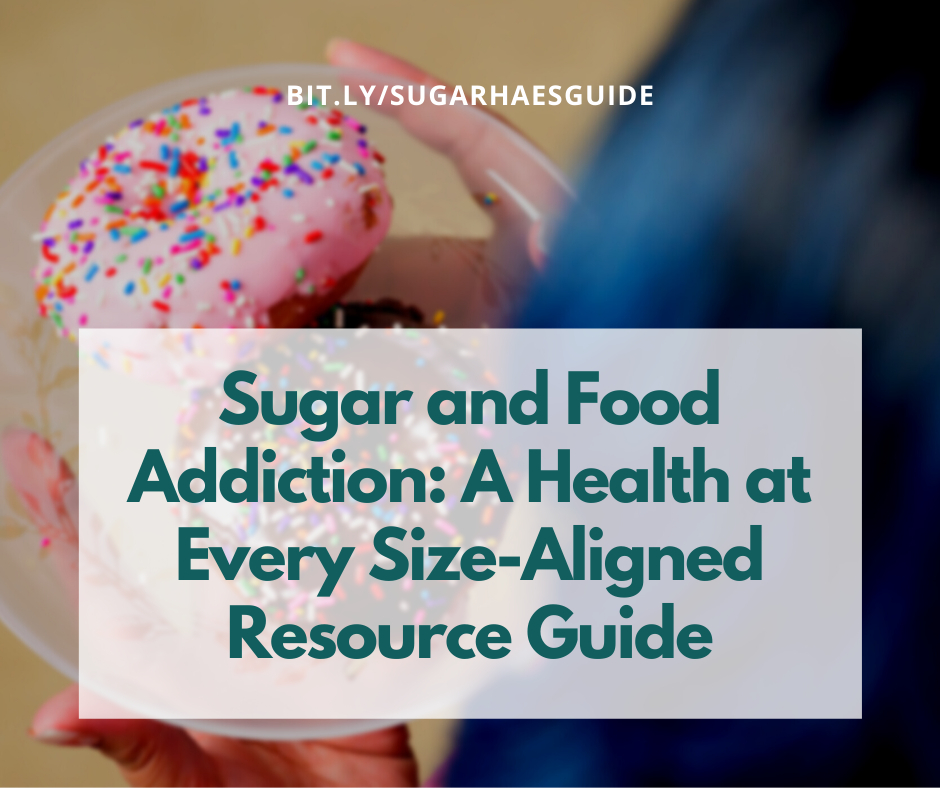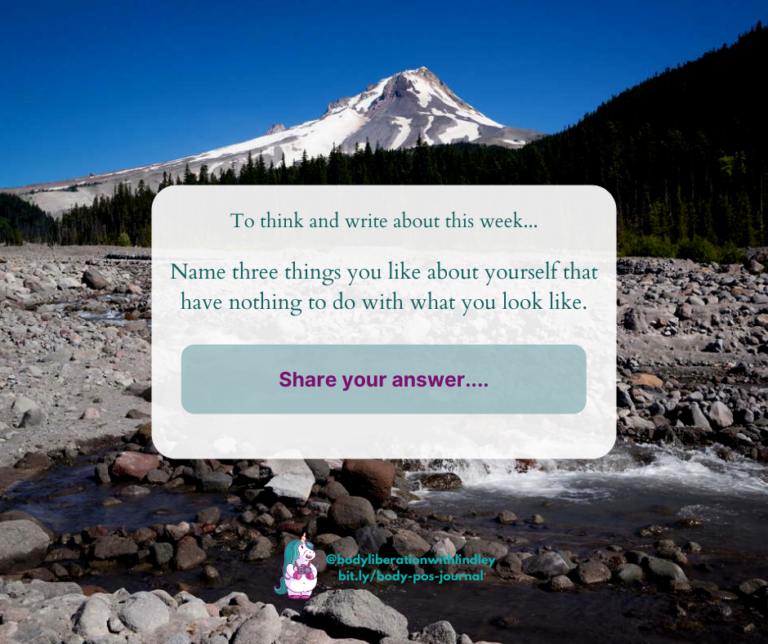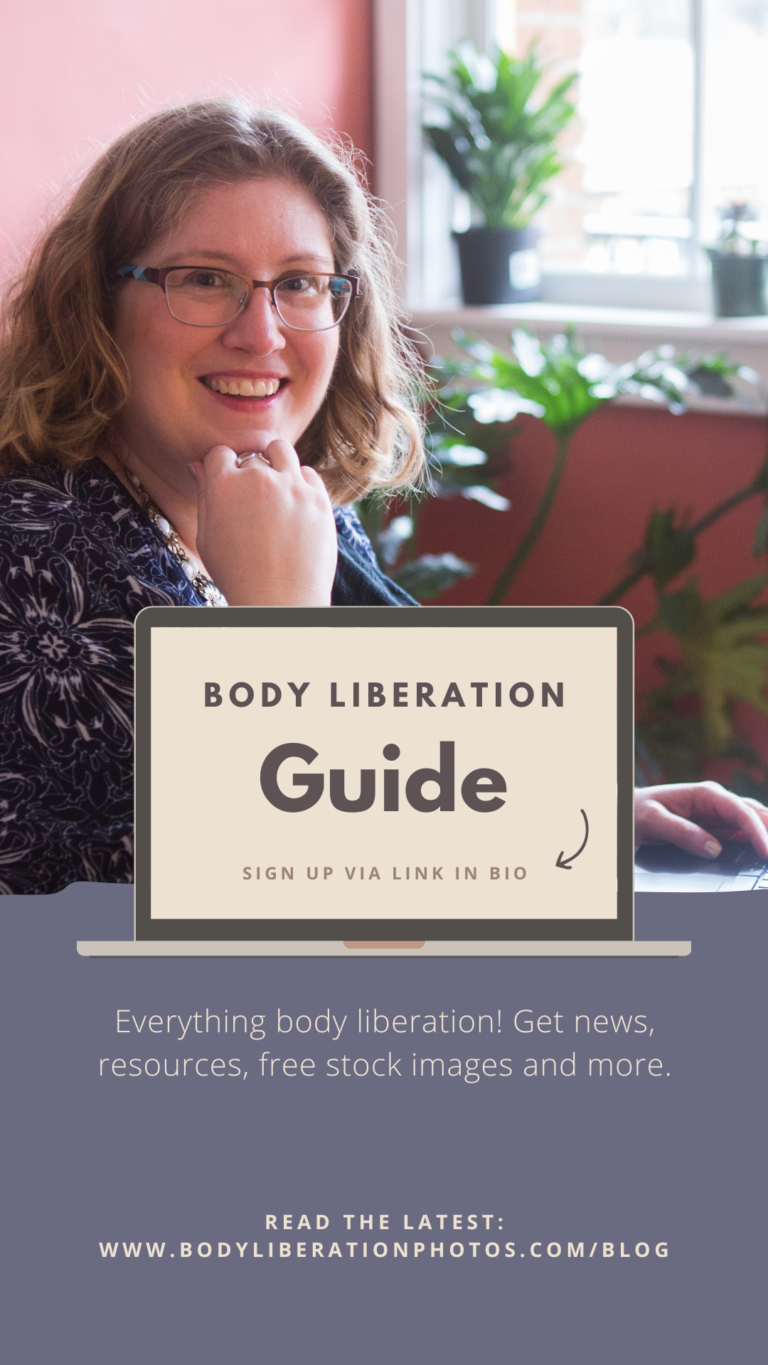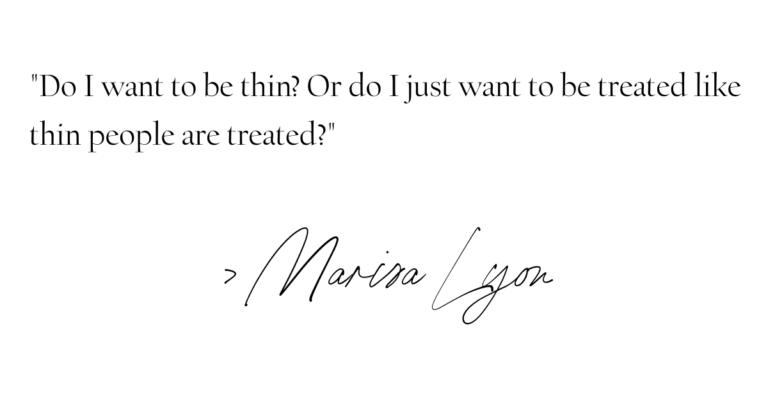Sugar and Food Addiction: A Health at Every Size-Aligned Resource Guide
This post may contain affiliate links, which allow us to earn commissions on products we recommend. All opinions are our own.
Is sugar really that bad for you? Is it possible to be addicted to sugar, or to food in general? Can you give yourself diabetes by eating too many sweet things, or too much sugar? What kind of cultural currents and dialogue exist around sugar consumption that could affect how we think about it today?
Very little scientific proof exists to indicate that humans — who need food, including sugars and carbs, to live — can be “addicted” to sugar or food. In other words, food in general and sugar specifically are not addictive substances. We also know from evidence-based research that sugar consumption has very little to do with whether you will get any form of diabetes, including type 2.
Sources that say otherwise are part of the diet-culture hysteria (which is cyclical — remember the butter/margarine wars of the 1980s?) that demonizes fatness and fat bodies and stems from hundreds of years of racist, sexist and fatphobic size discrimination. Whenever someone tells you you shouldn’t be eating a particular food, ask two questions:
- Who profits from telling me this?
- Where are the peer-reviewed, long-term studies that support this view?
Here are some evidence-based resources on sugar, food and diabetes from an evidence-based, Health at Every Size (HAES) perspective.
1. Sugar Addiction: A Summary Of The Science (Marci RD)
“To date there is absolutely zero scientific evidence that particular foods are addictive nor is there an objective measure with which food addiction can be explained. All of the human research that demonstrates “addiction” is based on the use of the Yale Food Addiction Scale, which is a reflection of an individual’s experience with food and does not account for dieting or restriction. There is ample neurobiological data that restriction amplifies the saliency (read attractiveness and yumminess) of food.”
Read more: https://marcird.com/sugar-addiction-summary-science/
2. No, Sugar Isn’t the New Heroin (Traci Mann in Behavioral Scientist)
“I’m a professor of health psychology, and when I give lectures on healthy eating, I often discourage people from cutting out any particular foods or food groups. Inevitably, the first question I get is, “Even sugar?” Once, when I mentioned to a fellow scientist that I was fine with my kids eating sugar in moderation, he could barely hide his horror as he said that I must be fine with them using a little heroin now and then too.”
Read more: https://behavioralscientist.org/no-sugar-isnt-new-heroin/
3. Body Image, Self Compassion & ‘Food Addiction’ w/ Marci Evans of Marci RD (Don’t Salt My Game Podcast from Laura Thomas)
“Today I’m talking to the incredible Marci Evans about body image, self-acceptance, and food ‘addiction’. Marci is a certified EDRD, a body image healer, and intuitive eating counsellor. Our conversation is a great antidote to all the diet culture BS you’re seeing everywhere right now. We talk about why it’s so challenging to develop positive body image, what real body positivity actually means and thin privilege. We also look more closely at self-acceptance and self-compassion and why developing practices around these concepts can help you heal your body image. Finally we go deep on the science around the idea of food ‘addiction’ and discuss what the evidence really means; plus some ideas on how to help build a healthier relationship with foods you feel you might be addicted to.”
4. Banning soda, sugary cereal or ice cream for your kids may not be the best strategy (Casey Seidenberg in the Washington Post)
“Does restriction actually work? The answer is no. Restricting food does not create healthy eating habits: In fact it usually backfires, steering children to sneak food and overeat.”
5. Why Fear of ‘Sugar Addiction’ May Be More Toxic Than Sugar Is (Rebecca Scritchfield in Self)
“But what’s even more important to me, as someone who helps people find ways of eating that are good for their psychological as well as physical health, is that there exists a happy medium between the kind of food anxiety where you feel you’re one bite away from certain disease and making the choice to eat foods with added sugar, feeling good about that choice, and overall eating a balanced, nutritious diet that helps keep you healthy.”
Read more: https://www.self.com/story/why-fear-of-sugar-addiction-may-be-more-toxic-than-sugar-is
6. Purity Through Food: How Religious Ideas Sell Diets (James Hamblin in The Atlantic)
“Yes, sugar was bad even before diabetes and obesity existed in the average person’s mind. The reasoning? Pleasure was sinful. People blamed hypersexuality and alcoholism on sugar. Sugar was foreign, it was associated with savages who eat it; it was bad. According to James Redfield’s 1852 book Comparative Physiognomy, animals that eat honey are courageous and careful, like the bee, the hummingbird, and the bear, while those that prefer sugar are not virtuous, like the housefly or “the ant that lives in the sugar bowl.” Even though honey is higher in fructose than the high-fructose corn syrup people now love to blame for all of our health problems, honey has long had enjoyed a halo of naturalness. It’s the same halo that protects juice but demonizes soda, even though the differences at a macronutrient level are negligible.”
Read more: https://www.theatlantic.com/health/archive/2015/05/the-puritanical-approach-to-food/392030/
7. On Geneen Roth, Sugar, “Do No Harm,” Unicorns and Healing (Be Nourished)
“Geneen Roth recently posted a statement on Facebook (in the wake of her Super Soul Sunday appearance) to clarify her thoughts on addiction and sugar. She stated that though she doesn’t endorse food addiction, she is suspect about sugar. She said “sugar begets more sugar” and she believes it intrinsically contributes to binge behavior and/or overeating. She warns about the dangers of consuming sugar and suggests that some people may want to give it up altogether, although she allows herself “one small piece of chocolate daily.”
This is not what we believe promotes healing. Healing would involve addressing the inconsistencies and messages we have internalized that overvalue under-eating and food restraint and pathologize eating episodes that we deem to be “too much”. We see that our lives and relationship with food are replete with so much complexity that our attachment to one food over another is always worth examining and understanding.”
Read more: https://benourished.org/geneen-roth-sugar-no-harm-unicorns-healing
8. The Truth About “Food Addiction” with Marci Evans, Certified Intuitive Eating Counselor and Eating-Disorder Dietitian (Food Psych Podcast from Christy Harrison)
“Fellow anti-diet dietitian Marci Evans shares why some people feel “addicted” to food, what the science actually says about so-called food addiction, how intuitive eating and Health at Every Size can help you recover from disordered eating behaviors, why it’s so important that eating-disorder specialists NOT also try to sell weight loss, and lots more.”
Listen to the podcast: http://foodpsych.libsyn.com/repost-80-the-truth-about-food-addiction-with-marci-evans
9. Food, Eating Disorders, and Addiction (Resilient Fat Goddex)
“Eating disorders are not addictions. While this statement is supported by many in the eating disorder (ED) community, it seems like a fairly fringe idea to assert for those outside the ED community. In this essay, I will provide a critique of research commonly used to equate eating disorders with addictions, particularly food and/or sugar addiction. What many people who research food addiction and those who support the food addiction model actually are referring to is the effect of semi-starvation and starvation on the body, not food addiction. Once semi-starvation and starvation stop, rehabituation can occur and what is seen as cravings and an eating disorder can stop. The main components of an addiction that will be discussed are chronic disease of motivation, memory and related circuitry, the pathological pursuit of reward and/or relief, the inability to abstain due to cravings, abstinence as treatment, and intoxication as well as tolerance.”
SJ’s site is currently down. Hopefully they’ll be back soon!
Read more: https://www.resilientfatgoddess.com/blog/2018/2/6/foodedaddiction
10. Is sugar “physically” addictive? Let’s assess the BS (Isabel Foxen Duke)
“If you know any heroin addicts they will tell you it is very physically painful to come off…and withdrawal from alcohol can physically kill you.
This is not the case with sugar. While some people report feeling temporarily lethargic or lackluster when they initially give up white sugar, physical withdrawal symptoms are mild to non-existent, and most people report feeling physically better when they eat less refined sugar, rather than the reverse.”
Read more: https://isabelfoxenduke.com/is-sugar-physically-addictive-lets-discuss-2/
11. Food Addiction: A Round-Up Of Resources (Josée Sovinsky Nutrition)
“Food and sugar addiction is definitely a hot topic. Whether it really exists is debated by researchers and clinicians, and it’s hard to get a straight answer. However, what we do know is there are some people who feel they struggle with food addiction, are at a loss and do not know how to make peace with food. Their issue may not be properly labelled, but either way it is a struggle.
That being said, I thought I would put together a list of resources for those who feel like they struggle with this issue and want to learn more about food addiction.”
Read more: https://www.joseesovinskynutrition.com/blog/food-addiction-resources-july2018
12. A Little Nutrition Sanity – Sugar: The Other White Powder – Rhetoric vs. Reality (Jon Robison)
“So, what about sugar? It is undeniably true that eating sugary foods increases the release of dopamine through these pathways and makes us feel good. Does this mean we are addicted to sugar?
Although it is certainly more titillating to conclude the answer is yes, in this case it turns out that the more truthful answer to the question is a much more boring, not really. Because in fact, the list of things that light up these dopaminergic pathways does not stop at drugs of abuse and highly palatable foods.”
Read more: https://www.linkedin.com/pulse/little-nutrition-sanity-sugar-other-white-powder-rhetoric-jon-robison
13. You Can’t Sweets Your Way Into Diabetes
“As my line of questioning quickly turned into the self-blame game, my doctor said something that changed my outlook on my diagnosis.
He said, ‘For you, it wasn’t a matter of if you would get diabetes, it was a matter of when.’”
Read more: https://www.healthline.com/health/diabetes/sugar-doesnt-cause-diabetes?#1
14. Does Sugar Weaken Your Immune System?
We are Virginia Sole-Smith and Corinne Fay, and it’s time for your January Indulgence Gospel.
Today, we’re getting into three big questions for you:
Does sugar destroy your immune system?
How do we stay hopeful when fat activism gets hard?
What’s the deal with 1000 Hours Outside—is it good parenting, or is it diet culture?
Listen here: https://podcasts.apple.com/us/podcast/does-sugar-weaken-your-immune-system/id1598931199?i=1000642892989
Hi! I’m Lindley.
I’m a photographer, author, cat mom, subscription box creator, and fat activist.
I help people reclaim their bodies through photography. I capture images of people of all sizes, ethnicities and genders, not just the ones whose bodies are likely to be seen in magazines and advertisements.
I also really enjoy putting together resources like this — so much that I do it every week!
Column 2
Hi there! I'm Lindley. I create artwork that celebrates the unique beauty of bodies that fall outside conventional "beauty" standards at Body Liberation Photography. I'm also the creator of Body Liberation Stock and the Body Love Shop, a curated central resource for body-friendly artwork and products. Find all my work here at bodyliberationphotos.com.







